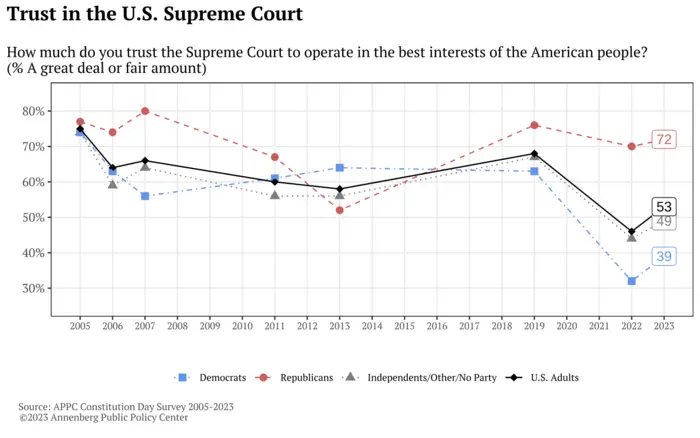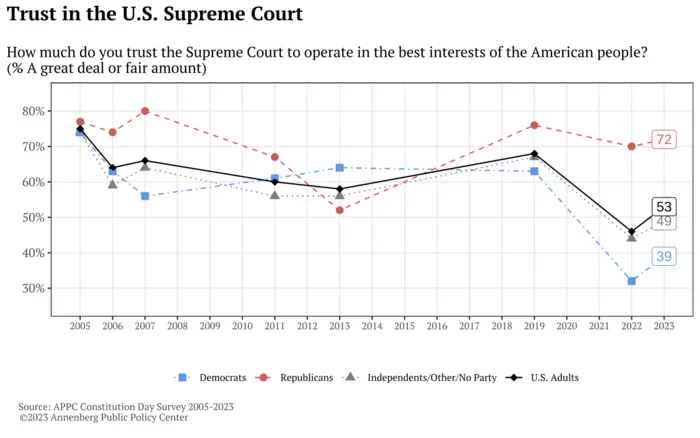For decades, the U.S. Supreme Court was viewed as one of the few American institutions respected by Democrats and Republicans alike. It was seen as a legal institution, not a political one, strengthened by its “norms, processes, symbols, and independence” – and was granted greater public trust and legitimacy than most other institutions.

Credit: Annenberg Public Policy Center
For decades, the U.S. Supreme Court was viewed as one of the few American institutions respected by Democrats and Republicans alike. It was seen as a legal institution, not a political one, strengthened by its “norms, processes, symbols, and independence” – and was granted greater public trust and legitimacy than most other institutions.
But that privileged status is no more. New research led by the Annenberg Public Policy Center of the University of Pennsylvania finds that the court’s “special status has evaporated” and that the court’s dramatic shift to the right, capped by the 2022 ruling in Dobbs v. Jackson Women’s Health, has upended that favored relationship and polarized the public’s view of the court along partisan lines for the first time in decades.
These findings are in the article “Has the Supreme Court become just another political branch? Public perceptions of court approval and legitimacy in a post-Dobbs world,” published March 8, 2024, in Science Advances. In its June 24, 2022, Dobbs ruling, the Supreme Court overturned the popular, half-century-old Roe v. Wade decision establishing a constitutional right to abortion.
“The most important takeaway is that pre-2022, pre-Dobbs, there is no real evidence of political polarization in the public’s views of the Supreme Court,” said lead author Matthew Levendusky, a political scientist at the University of Pennsylvania’s School of Arts and Sciences and the Stephen and Mary Baran Chair in the Institutions of Democracy at the Annenberg Public Policy Center (APPC).
“We have data from the Annenberg Public Policy Center’s Constitution Day surveys going back to 2006,” Levendusky said, “and on occasion we see trust and approval bounce around a bit between Democrats and Republicans. But starting in 2022, we see very clear views of partisan polarization of the court so that post-Dobbs, those who support abortion access or are Democrats think much less of the court, while people who are Republican or disapprove of abortion think highly of the court.”
Highlights
From 2005-2019, large majorities of Americans across the political spectrum either had a “great deal” or a “fair amount” of trust in the Supreme Court, according to APPC surveys. From 2019 to 2022, however, confidence in the Supreme Court plunged 22 percentage points, from 68% to 46%, a finding mirrored in data from other survey firms, including Gallup and Pew.
In Science Advances, the researchers find:
- Using 18 nationally representative surveys spanning nearly two decades, there was little evidence of partisan polarization in the earlier years – but in 2022 and 2023, evidence of polarization is clear in measures of favorability, trust, legitimacy, and support for reform of the court.
- Knowledge of the court and support for key democratic values no longer protect the court in the way that they once did. “These findings suggest that at least part of the public increasingly sees the Court as politicians in robes, with troubling implications for its role in our democracy.”
- A content analysis to understand how the public learned about Dobbs – measuring coverage in the media agenda-setting New York Times – found that the Times published more stories on the court in 2022 than in any year since 2008 and that Dobbs and the issue of abortion “received a simply unprecedented share” (60%) of that coverage.
Legitimacy and trust
For most of the past two decades, partisanship had only a weak effect on views about the court’s legitimacy, the researchers said. This changed in 2022 and held in 2023. Democrats saw the court as less legitimate and Republicans saw it as more so. Democrats thought that the court was “too mixed up in politics,” favored stripping its jurisdiction on certain issues, thought that its power should be reduced and it should be made less independent, and thought that the justices used their political beliefs, not the law, to decide cases.
“The stark polarization that existed in 2022 endures, and this is quite worrying,” the researchers said. “A significant part of the public now sees the Court as just another political branch, not a legal institution above politics.”
The declining sense of the court’s legitimacy is the most troubling, the researchers said. “As Hamilton noted in Federalist 78 more than 230 years ago, the Court has ‘neither force nor will, but merely judgment’ – it cannot enforce its decisions, but instead must persuade the other branches and the public to obey them, something that can only come from legitimacy. When this legitimacy erodes, politicians and the public are more likely to curb the Court’s power and constrain its independence through significant reforms.”
Levendusky added: “That’s why factors such as trust and legitimacy are so important – so that people will trust the court and obey its decisions. Once that gets called into question – and the evidence is clear that Dobbs has done that – we’re potentially in a very dangerous place.”
In his year-end reports to the judiciary, Chief Justice John Roberts has noted similar concerns. In 2019, he wrote, “I ask my judicial colleagues to continue their efforts to promote public confidence in the judiciary, both through their rulings and through civic outreach.” Discussing judicial ethics in his 2021 report, he wrote that “public trust is essential, not incidental, to our function.”
About the article
The Science Advances article is based on eight waves of an APPC Annenberg Institutions of Democracy panel study first fielded during the 2020 presidential election cycle in the swing states of Michigan, Pennsylvania, and Wisconsin with about 1,200 eligible voters in each state, continuing through 2023. The article also uses 18 nationally representative surveys tracking perceptions of the court since 2005 that were conducted either by the Annenberg Public Policy Center or by the Weidenbaum Center at Washington University, which show that the current partisan polarization is anomalous.
In addition to Levendusky, the article’s authors are Shawn Patterson Jr., an APPC research analyst; Michele Margolis, an associate professor of political science at the University of Pennsylvania; Josh Pasek, an associate professor of communication and media and political science at the University of Michigan; Ken Winneg, managing director of survey research, APPC; and Kathleen Hall Jamieson, director, APPC.
“Has the Supreme Court become just another branch? Public perceptions of court approval and legitimacy in a post-Dobbs world” was published March 8, 2024, by Science Advances.
Is polarization spreading to views of the judiciary?
A second article by a research team at the Annenberg Public Policy Center that examines the judiciary more broadly is in press in the journal Judicature. Based on Annenberg surveys, including a nationally representative survey of U.S. adults conducted in October 2023, the Judicature analysis finds that the public has more trust in the judiciary as a whole than in the Supreme Court in particular, said Patterson, the lead author.
“However, the data do suggest that the polarization we are seeing in views of the Supreme Court is starting to trickle down to perceptions of the courts at large,” Patterson said.
The article, co-authored by Levendusky, Winneg, and Jamieson, is scheduled for print publication in Judicature’s June issue.
###
The Annenberg Public Policy Center was established in 1993 to educate the public and policy makers about communication’s role in advancing public understanding of political, science, and health issues at the local, state, and federal levels.
Journal
Science Advances
DOI
10.1126/sciadv.adk9590
Method of Research
Survey
Article Title
Has the Supreme Court become just another political branch? Public perceptions of court approval and legitimacy in a post-Dobbs world
Article Publication Date
8-Mar-2024





